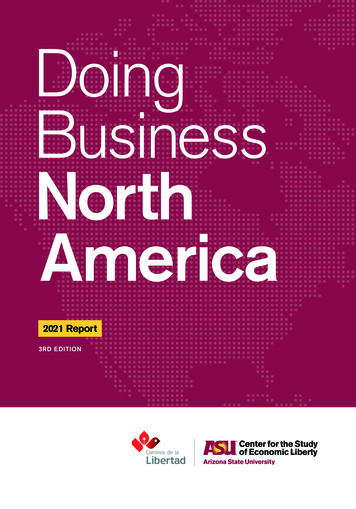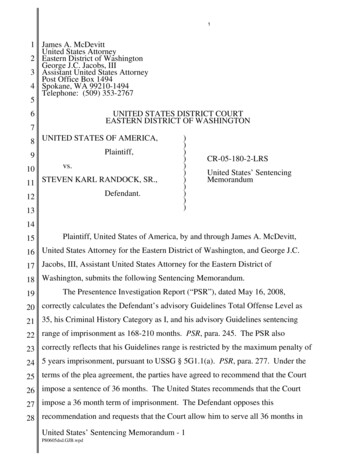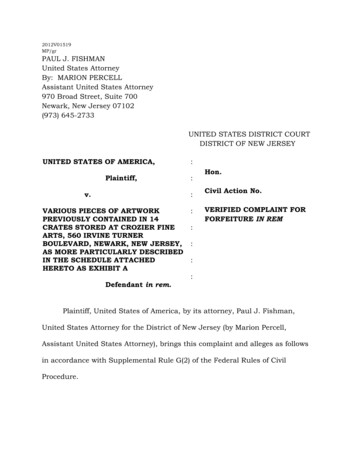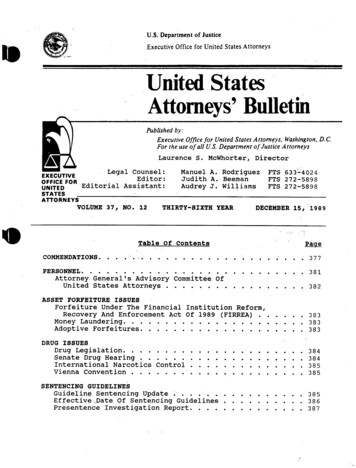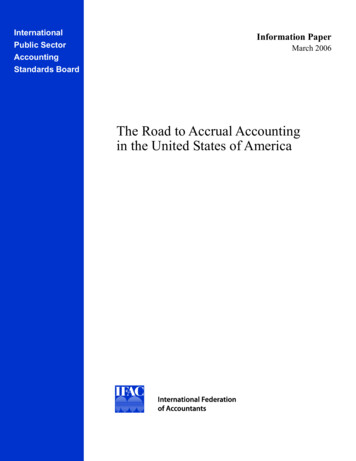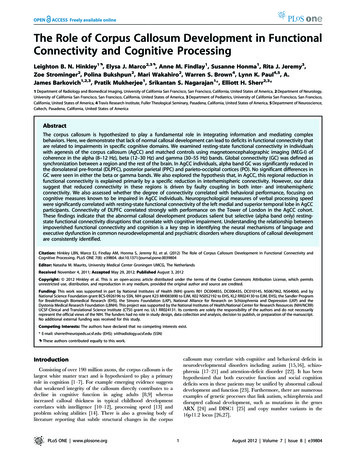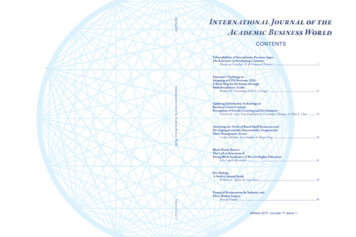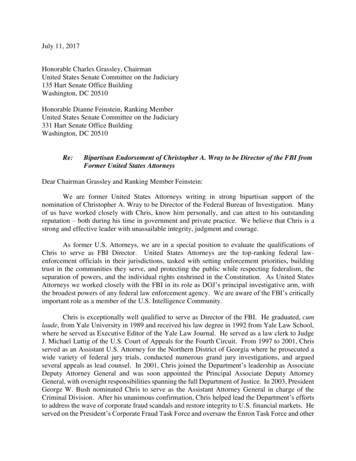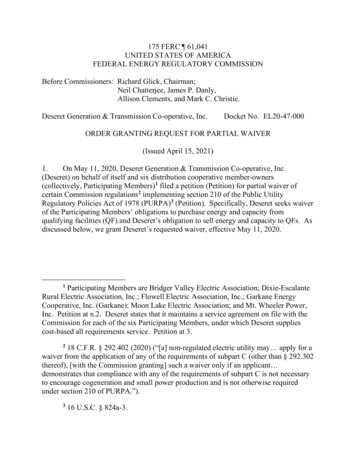
Transcription
175 FERC ¶ 61,041UNITED STATES OF AMERICAFEDERAL ENERGY REGULATORY COMMISSIONBefore Commissioners: Richard Glick, Chairman;Neil Chatterjee, James P. Danly,Allison Clements, and Mark C. Christie.Deseret Generation & Transmission Co-operative, Inc.Docket No. EL20-47-000ORDER GRANTING REQUEST FOR PARTIAL WAIVER(Issued April 15, 2021)On May 11, 2020, Deseret Generation & Transmission Co-operative, Inc.(Deseret) on behalf of itself and six distribution cooperative member-owners(collectively, Participating Members) 1 filed a petition (Petition) for partial waiver ofcertain Commission regulations 2 implementing section 210 of the Public UtilityRegulatory Policies Act of 1978 (PURPA) 3 (Petition). Specifically, Deseret seeks waiverof the Participating Members’ obligations to purchase energy and capacity fromqualifying facilities (QF) and Deseret’s obligation to sell energy and capacity to QFs. Asdiscussed below, we grant Deseret’s requested waiver, effective May 11, 2020.1Participating Members are Bridger Valley Electric Association; Dixie-EscalanteRural Electric Association, Inc.; Flowell Electric Association, Inc.; Garkane EnergyCooperative, Inc. (Garkane); Moon Lake Electric Association; and Mt. Wheeler Power,Inc. Petition at n.2. Deseret states that it maintains a service agreement on file with theCommission for each of the six Participating Members, under which Deseret suppliescost-based all requirements service. Petition at 3.218 C.F.R. § 292.402 (2020) (“[a] non-regulated electric utility may apply for awaiver from the application of any of the requirements of subpart C (other than § 292.302thereof), [with the Commission granting] such a waiver only if an applicant demonstrates that compliance with any of the requirements of subpart C is not necessaryto encourage cogeneration and small power production and is not otherwise requiredunder section 210 of PURPA.”).316 U.S.C. § 824a-3.
Docket No. EL20-47-000I.-2-BackgroundDeseret states that it is a Commission-jurisdictional generation and transmissionservice (G&T) cooperative that provides wholesale service to its Participating Memberspursuant to Commission-approved market-based rate authority. 4 Deseret states that itsParticipating Members provide retail service to approximately 70,000 retail electriccustomers in Utah, Nevada, Wyoming, Colorado, and Arizona. 5II.PetitionDeseret states that it seeks waiver of its obligation under section 292.303(b) of theCommission’s regulations6 to make sales directly to QFs, and that the ParticipatingMembers seek waiver of their obligation under section 292.303(a) of the Commission’sregulations 7 to make purchases directly from QFs. Deseret proposes, and theParticipating Members agree, that Deseret will assume the obligations of its ParticipatingMembers to make purchases from QFs, while the Participating Members will assume theobligation of Deseret to make sales to QFs. 8Under a PURPA Qualifying Facilities – Joint Implementation Plan, Deseret andthe Participating Members agree to interconnect with any QF pursuant to the relevantinterconnection rules. Deseret will purchase capacity and energy from QFs at Deseret’savoided cost rate and each Participating Member will sell supplementary, back-up andmaintenance power to QFs at rates that comply with PURPA. No QF will be subject toduplicative charges for interconnection or wheeling as a result of selling to Deseret andpurchasing from a Participating Member. 9Deseret contends that waiver of the Participating Members’ purchase obligation isconsistent with PURPA’s mandate because Deseret is willing to stand in the shoes of theParticipating Members by paying QFs its full avoided cost for their output. Deseret alsostates that the Participating Members rely on Deseret to meet their capacity and energy4See Petition at 3 (citing MEP Investments, LLC, 87 FERC ¶ 61,209 (1999)).5Id. at 4.618 C.F.R. 292.303(b) (2020).718 C.F.R. § 292.303(a).8Petition at 6.9Id. at 7-8, 10.
Docket No. EL20-47-000-3-requirements and that granting the waiver will allow Deseret to coordinate power supplydecisions in a centralized and efficient manner on behalf of the Participating Members. 10Deseret also requests waiver of its own obligation to sell energy and capacitydirectly to QFs pursuant to section 292.303(b) of the Commission’s regulations. Deseretexplains that because the Participating Members are retail utilities, they are in a betterposition to provide the interconnection and retail service required by QFs. Deseret statesthat its Participating Members are committed to provide supplementary, back-up andmaintenance power to QFs as requested, on either a firm or interruptible basis, at ratesthat are nondiscriminatory, just and reasonable, and in the public interest. 11III.NoticeNotice of the Petition was published in the Federal Register, 85 Fed. Reg. 29,937(May 13, 2020), with interventions and protests due on or before June 1, 2020. Garkaneand Kanab Solar LLC (Kanab Solar) filed motions to intervene. Kanab Solar filed aprotest; Deseret and Garkane filed an answer.IV.Protest and AnswersIn its protest, Kanab Solar states that it does not oppose the Petition but asks thatthe Commission clarify that the waivers, if granted, would apply prospectively to thoseQFs that do not have an existing power purchase agreement (PPA) or legally enforceableobligation (LEO) 12 with one of the Participating Members.Kanab Solar explains that, from December 2019 to March 2020, it was negotiatingto sell its output to Garkane, a Participating Member. Kanab Solar further explains thatthe parties disagreed over whether Garkane was a full or partial requirements customer ofDeseret and thus whether Garkane’s or Deseret’s avoided cost should apply to Garkane’s10Id. at 6, 811Id. at 7-8, 14.12The Commission has held that a LEO can take effect before a contract isexecuted and may not necessarily be incorporated into a contract. JD Wind 1, LLC, 129FERC ¶ 61,148, at P 25 (2009), reh’g denied, 130 FERC ¶ 61,127 (2010) (“[A] QF, bycommitting itself to sell to an electric utility, also commits the electric utility to buy fromthe QF; these commitments result either in contracts or in non-contractual, but binding,legally enforceable obligations.”).
Docket No. EL20-47-000-4-purchases from Kanab Solar. 13 According to Kanab Solar, Garkane stated that it intendedto provide a draft PPA to Kanab Solar around April 1, 2020. Kanab Solar states thatlater, Garkane stated it would provide a draft PPA, unless Deseret decided to file a waiverrequest with the Commission. 14 Kanab Solar states that, on April 23, 2020, Deseretnotified Kanab Solar that Deseret intended to file the instant Petition and that KanabSolar would need to negotiate a PPA with Deseret under the requested waiver.Kanab Solar contends that, on April 28, 2020, Kanab Solar provided Garkane apartially executed PPA in which Kanab Solar estimated Garkane’s avoided cost andasked Garkane to execute the PPA. Kanab Solar states that, after Deseret and Garkanestated that neither of them would accept the PPA, Deseret filed the Petition. Kanab Solarasserts that Garkane delayed negotiations with Kanab Solar so that Deseret could file thePetition and thereby require Kanab Solar to sell its output to Deseret, instead ofGarkane. 15Kanab Solar explains that the standard for establishing a LEO is that which isadopted by the relevant state utility commission and is consistent with the Commission’sregulations implementing PURPA. 16 While Kanab Solar asserts that it is unaware of thePublic Service Commission of Utah (Utah Commission) or the state courts adopting adefinitive standard for when a LEO is established, Kanab Solar cites a Utah Commissioncase in which the Utah Commission determined that a QF could establish a LEO bydemonstrating that a contract would have been executed “but for” some action or nonaction of the purchasing utility. 17 Kanab Solar thus concludes that a QF can establish a13Kanab Solar states that, even if Garkane is a full requirements customer ofDeseret, the Commission should still grant the waiver on a prospective basis in order toallow Kanab Solar to sell to Garkane.14Petition at 7.15Kanab Solar Protest at 4-8. In its protest, Kanab Solar summarizes six monthsof negotiations between itself, Garkane, and Deseret and includes copies of emails andletters in Attachment A. Kanab Solar asserts that Garkane’s avoided cost rate is greaterthan Deseret’s avoided cost rate.1617Id. at 10 (citing Cedar Creek Wind, LLC, 137 FERC ¶ 61,006, at P 35 (2011)).Id. (referencing In re the Application of Rocky Mountain Power for Approval ofthe Power Purchase Agreement between PacifiCorp and Thayn Hydro, LLC., Docket No.16-035-04, Order 9-15 (July 20, 2016) (finding that meeting this “but for” standardwould be sufficient to demonstrate a LEO exists, but would not be a necessary predicateto establish a LEO)).
Docket No. EL20-47-000-5-LEO once the QF commits to sell, and prior to the “but for” standard of utilityacceptance.Kanab Solar states that the Utah Commission also found that a new QF “shouldexpect to satisfy customary standards and diligence requirements” before obtaining aLEO. Kanab Solar states that it met this standard prior to Deseret filing the Petition,arguing that Kanab Solar committed to sell energy and capacity to Garkane and providedall necessary information, made several requests for a PPA, negotiated terms withGarkane, and submitted an executed PPA to Garkane.In their answer, Deseret and Garkane dispute Kanab Solar’s allegation that Deseretwas unwilling to negotiate with Kanab Solar. Deseret and Garkane state that, as Deseretis a full-requirements supplier, Garkane’s avoided cost rate is Deseret’s avoided cost rateso Kanab Solar should have negotiated the PPA with Deseret, not Garkane, regardless ofwhen the Petition was filed. Deseret and Garkane assert that, in insisting on selling toGarkane, Kanab Solar is seeking an “above avoided cost rate” from Garkane, contrary tothe Commission’s regulations, which state “nothing requires any electric utility to paymore than the avoided costs for purchases.” 18 Further, Deseret and Garkane note thatGarkane has begun interconnection studies to accommodate Kanab Solar’s facility, andthat Deseret has offered to purchase Kanab Solar’s output at Deseret’s avoided cost rate.Deseret and Garkane emphasize that, because Garkane’s avoided cost rate is the same asDeseret’s avoided cost rate, Kanab Solar has not established a LEO and Kanab Solarcannot receive a higher avoided cost rate from Garkane.Deseret and Garkane further assert that Deseret has specifically incorporatedreferences to the requirements of Order No. 69 in its requirements contracts on file withthe Commission under FPA section 205. Specifically, Deseret and Garkane argue thatDeseret’s wholesale power contract’s rate schedule in its contract with Garkane providesthat Garkane’s avoided cost rate must be based on Deseret’s avoided cost rate, which isthe rate that Deseret develops and reviews from time to time. 19V.DiscussionPursuant to Rule 214 of the Commission’s Rules of Practice and Procedure,18 C.F.R. § 385.214 (2020), the timely unopposed motions to intervene serve to makeGarkane and Kanab Solar parties to this proceeding. Rule 213(a)(2) of the Commission’sRules of Practice and Procedure,18 C.F.R. § 385.213(a)(2) (2020), prohibits an answer toa protest unless otherwise ordered by the decisional authority. We accept Deseret’s and1818 C.F.R. § 292.304(a)(2).19Deseret Answer at 13.
Docket No. EL20-47-000-6-Garkane’s answer because it provided information that assisted us in our decision-makingprocess.As discussed below, we grant the Petition, effective May 11, 2020, the dateDeseret filed the Petition. Further, we have determined, based on the record before theCommission, and barring any restrictions under state law, that Kanab Solar established aLEO with Garkane prior to Deseret filing the Petition. 20Under section 292.402(b) of the Commission’s regulations, the Commission maygrant waivers of sections 292.303(a) and (b), where compliance with these sections is notnecessary to encourage cogeneration and small power production and is not otherwiserequired under PURPA section 210. 21 The Commission has previously granted waiversof sections 292.303(a) and (b) where the generation and transmission cooperative utilityagreed to purchase QF power at its avoided cost on behalf of its distribution cooperativeutilities, and the distribution cooperative utilities agreed to offer supplementary,interruptible, back-up, and maintenance power to QFs at rates that are nondiscriminatory,just and reasonable. 22As discussed below, we grant the partial waiver of certain obligations imposed onDeseret and its Participating Members under sections 292.303(a) and 292.303(b) of theCommission’s regulations. Specifically, we grant waiver of the Participating Members’obligations to purchase energy and capacity from QFs and Deseret’s obligation to sellenergy and capacity to QFs. Waiver is appropriate for the utilities that have agreed:(1) to allow Deseret, as their requirements supplier, to purchase power from the QFsinterconnecting to their systems; and (2) to sell back-up and other power to such QFsbecause the QFs will remain in essentially the same position as they currently stand.Granting waiver of the Participating Members’ purchase obligation will not frustrate thePURPA mandate to encourage power production by QFs because no QF will be deprivedof an avoided cost sale of its power and each QF will receive the full avoided cost rate.Similarly, granting waiver of Deseret’s sales obligation will not frustrate the PURPAmandate because each Participating Member will offer supplementary, back-up and20See infra notes 27-28 and accompanying text. We note that whether Garkane isa full-requirements purchaser and whether Garkane’s avoided cost rate is equal toDeseret’s avoided cost rate are pricing issues and are beyond the scope of thisproceeding. This proceeding only addresses the waiver of the respective obligations ofDeseret and its Participating Members, and the establishment of a LEO.212218 C.F.R. § 292.402(b).See, e.g., Seminole Electric Cooperative, Inc., 39 FERC ¶ 61,354, at 62,112(1987); accord Heartland Consumers Power District, 154 FERC ¶ 61,203, at PP 26, 28(2016).
Docket No. EL20-47-000-7-maintenance power on a firm or interruptible basis to QFs at rates that arenondiscriminatory, just and reasonable, and in the public interest.In Cedar Creek, the Commission explained that a LEO is designed to protect a QFby preventing an electric utility from avoiding its PURPA obligations by refusing to signa contract, or from delaying the signing of a contract, so that a later and lower avoidedcost is applicable. 23In East Kentucky, 24 the Commission found a LEO had been potentially establishedprior to the electric utility filing an application pursuant to FPA section 210(m) andsection 292.310 of the Commission’s regulations. In that instance, the electric utilityrequested to terminate the mandatory purchase obligation from QFs greater than 20 MWand the Commission addressed protests claiming the existence of a LEO prior to theelectric utility’s filing with the Commission.Here, although Deseret disputes certain Kanab Solar assertions, the following factsare undisputed: Kanab Solar detailed the length of the negotiations between Garkane andKanab Solar, the level of detail in the negotiations, Garkane’s stated intent to provide aPPA and then the delayed negotiations, and Deseret’s subsequent direction to Kanab Solarto negotiate with Deseret. These undisputed facts support our determination, based on thefacts before us and barring any restriction under state law, that Kanab Solar established aLEO with Garkane prior to the date Deseret filed the Petition, i.e., on May 11, 2020. 25Consequently, neither Garkane nor Deseret can require Kanab Solar to sell to Deseret.23Cedar Creek, 137 FERC ¶ 61,006 at P 36 (citing W. Penn Power Co., 71 FERC¶ 61,153 at 61,495) (1995).24E. Ky. Coop., 160 FERC ¶ 61,053, at P 21 (2017) (finding that East Kentucky’swaiver request “did not foreclose Bluebird or Blue Jay from having established a legallyenforceable obligation under PURPA. Barring any restrictions under state law, Bluebirdand Blue Jay would be grandfathered such that Commission approval of this Applicationwould not include Bluebird or Blue Jay QFs.”). See also Neb. Pub. Power Dist.,156 FERC ¶ 61,043, at P 20 (2016) (finding “on this record that the Cottonwood QF byvirtue of its letter to NPPD requesting an NPPD purchase, has initiated a proceeding toestablish a contract or legally enforceable obligation and the Cottonwood QF’sapplication is pending approval before the applicable non-regulated electric utility; thatapplication is thus grandfathered.”).25This proceeding pre-dates Order No. 872, which became effective December 31,2020, and the changes to the LEO process adopted in that rule. Qualifying Facility Ratesand Requirements, Order No. 872, 172 FERC ¶ 61,041, order on reh’g, Order No. 872-A,173 FERC ¶ 61,158 (2020).
Docket No. EL20-47-000-8-In Order No. 688-A we noted that “in the division of responsibilities ofadministering PURPA between this Commission and state regulatory authorities (andnon-regulated utilities), it is the state regulatory authorities (or non-regulated utilities)that determine whether and when a legally enforceable obligation is created.” 26However, we also stated that “QFs that believe that some other sort of state proceedinghas created a legally enforceable obligation under state law may argue their claim beforethe Commission, and we will make such determinations on a case-by-case basis based onstate law.” 27 Here, we have made such a determination, and no party has pointed to anyprovision of state law that would lead to a different conclusion.28Whether or not Garkane’s avoided cost rate is the same as Deseret’s avoided costrate is not the issue before the Commission. Nothing in this order should be read toaddress that issue.Finally, we disagree with the argument that, having provided a PPA to KanabSolar, Deseret voided Kanab Solar’s LEO with Garkane or relieved Garkane from theLEO established prior to the effective date of the Petition. Allowing Deseret to voidKanab Solar’s LEO in this way would largely nullify the effect and purpose of a LEO.The Commission orders:Deseret’s Petition is hereby granted, effective May 11, 2020, as discussed in thebody of this order.By the Commission.(SEAL)Kimberly D. Bose,Secretary.26New PURPA Section 210(m) Regulations Applicable to Small Power Productionand Cogeneration Facilities, Order No. 688-A, 119 FERC ¶ 61,305 at P 139 (2007), aff’dsub nom. American Forest and Paper Association v. FERC, 550 F.3d 1179 (D.C. Cir. 2008).2728Id.Although no applicable state law provision has been cited to us, we note that“[w]hile the Commission gives deference to the states in determining the circumstancesfor when a legal enforceable obligation arises, such deference is subject to the terms ofCommission regulations.” Cedar Creek, 137 FERC ¶ 61,006 at P 35 & n.57 (citing WestPenn Power Co., 71 FERC ¶ 61,495).
Solar would need to negotiate a PPA with Deseret under the requested waiver. Kanab Solar contends that, on April 28, 2020, Kanab Solar provided Garkane a partially executed PPA in which Kanab Solar estimated Garkane's avoided cost and asked Garkane to execute the PPA. Kanab Solar states that, after Deseret and Garkane


